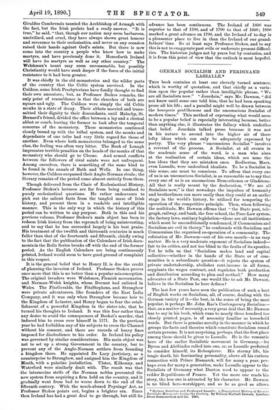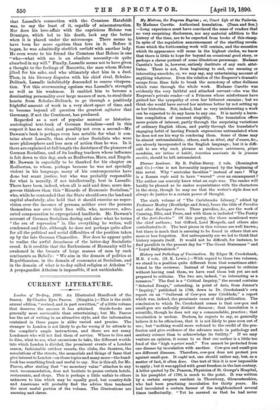GERMAN SOCIALISM AND FERDINAND LASSALLE.*
THIS book contains at least one cleverly turned sentence, which is worthy of quotation, and that chiefly as a varia- tion upon the popular rather than intelligible phrase, "We are all Socialists now." " Jourdain," says Mr. Dawson, "did not know until some one told him, that he had been speaking prose all his life; and a parallel might well be drawn between the bourgeois gentilhomme and the unconscious Socialist of modern times." This method of expressing what would seem to be a popular belief is especially interesting because, better than anything else, it illustrates the fallacy which underlies that belief. Jourdain talked prose because it was not in his nature to ascend into the higher air of those lofty ideas which can only be adequately expressed by poetry. The very phrase "unconscious Socialist" involves a reversal of the process. A Socialist, at all events in the academic sense of the word, is a man who aims at the realisation of certain ideas, which are none the less ideas that they are mistaken ones. Rodbertus, Marx, even Lassalle, were undoubted idealists. To be a Socialist in this sense, one must be conscious. To affirm that every one of us is an unconscious Socialist, is as reasonable as to say that every one of us is an unconscious Demosthenes or Gladstone. All that is really meant by the declaration, "We are all Socialists now," is that nowadays the impulses of humanity and brotherliness can more easily than they could at an earlier stage in the world's history, be utilised for tempering the operation of the competitive principle. Then, when following the multitude, Mr. Dawson affirms that "the State post, tele- graph, railway, and bank, the free school, the Poor-Law system, the factory laws, sanitary legislation—these are all institutions which must be unconditionally condemned, if Communism and Socialism are evil in theory," he confounds with Socialism and Communism the organised co-operation of a community. The refutation of Mr. Dawson—out of his own mouth—is an easy matter. He is a very moderate exponent of Socialism indeed— fair to its critics, and not too blind to the faults of its apostles. Yet he tells us that "Socialism makes land and capital collective—whether in the hands of the State or of com- munities is a subordinate question—it rejects the system of private undertakership, abolishes rent-income in all forms, supplants the wages contract, and regulates both production and distribution according to plan and method." How many advocates of a State Post, one would like to ask Mr. Dawson, believe in the Socialism he here defines?
The last few years have seen the publication of such a host of English works on Socialism, all, of course, dealing with the German variety of it—the best, in the sense of being the most popular, is perhaps Mr. John Rae's Contemporary Socialism— that, as a matter of necessity, a very great deal that Mr. Dawson has to say in his book, which runs to nearly three hundred too closely printed pages, is of necessity familiar as household words. But there is genuine novelty in the manner in which he groups the facts and theories which constitute Socialism round certain persons. It is not surprising, perhaps, that the first place among these should be given to Lassalle. He is the romantic hero of the earlier Socialistic movement in Germany,—its Byron and Alcibiades rolled into one, or, as Lassalle preferred to consider himself, its Robespierre. His stormy life, his tragic death, his fascinating personality, above all his curious connection with Prince Bismarck, will for many a year, per- haps even for many a generation, make Lassalle appear to the Socialists of Germany what Danton used to appear to the redder Republicans of France. Yet the more one reads his story, the less one is attracted by his character. Mr. Dawson is no blind hero-worshipper, and so he as good as allows
• German Socialism and Ferdinand Lassalle a Biographical History of German Socialistic Movements during the Century. By William Harbutt Dawson. London Swan Sonnenschein and Co. 1890. that Lassalle's connection with the Countess Hatzfeldt was, to say the least of it, capable of misconstruction. Nor does his love-affair with the capricious Helene von Donniges, which led to his death, look any the better when it is placed under the microscope. There seems to have been far more egotism than love in it. Before it began, he was admittedly sterblich verliebt with another lady. He even wrote to his friend the Countess that Helene is one "who—what with me is an absolute necessity—is quite absorbed in my will." Finally, Lassalle seems not to have given a thought to the feelings of Racowitz, the man whom Helene jilted for his sake, and who ultimately shot him in a duel. Then, in his literary disputes with his chief rival, Schulze- Delitsch, Lassalle indubitably descended to coarse vitupera- tion. Yet this overweening egotism was Lassalle's strength as well as his weakness. It enabled him to become a dominating personality over large masses of men, to steal their hearts from Schulze-Delitsch, to go through a positively frightful amount of work in a very short space of time, and to become beyond all question the greatest agitator that Germany, if not the Continent, has produced.
Regarded as a sort of popular manual or historico- sociological text-book of German Socialism—and in this respect it has no rival, and possibly not even a second—Mr. Dawson's book is perhaps even less notable for what it con- tains about Lassalle, than about other Socialists who were more philosophers and less men of action than he was. In it there are explained at full length the doctrines of the pioneers of German Socialism, and of its leading teachers whose influence is felt down to this day, such as Rodbertus, Marx, and Engels. Mr. Dawson is especially to be thanked for his chapter on Rodbertus, to whom, perhaps because he was not specially violent in his language, many of his contemporaries have done but scant justice, but who was probably responsible for what is morally, if not intellectually, best in Lassalle. There have been, indeed, when all is said and done, more dan- gerous thinkers than this "Ricardo of Economic Socialism," who, while he contended that the State should own the land and capital absolutely, also held that it should exercise no super- vision over the incomes of persons, neither over the persons themselves nor over their free wills, who, moreover, advo- cated compensation to expropriated landlords. Mr. Dawson's account of German Socialism during and since what he terms "the era of repression" is, like everything he writes, well condensed and fair, although he does not perhaps quite allow for all the political and social difficulties of the position taken up by the late German Chancellor. Nor does he appear quite to realise the awful dreariness of the latter-day Socialistic creed. Is it credible that the Enthusiasm of Humanity will be awakened in the breasts of large masses of men by such sentiments as Bebers : "We aim in the domain of politics at Republicanism; in the domain of economics at Socialism, and in the domain of what is to-day called religion at Atheism" P A propagandist Atheism is impossible, if not unthinkable.



















































 Previous page
Previous page